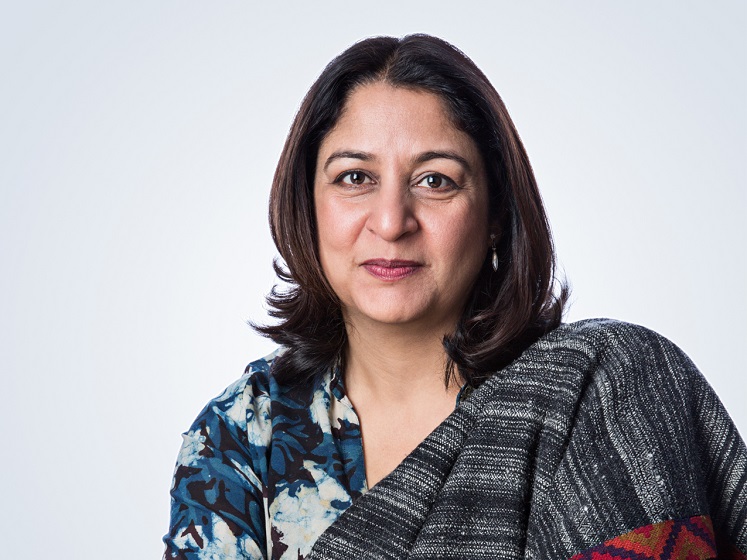 Safeena Husain
Safeena Husain
Safeena Husain (BSc Economic History 1995) is the Founder and Board Member at Educate Girls – a non-profit organisation that aims to bridge the gender gap in education in India. After graduating from LSE, she spent 15 years working with grassroots projects in Ecuador, Mexico, Bolivia, South Africa and Asia.
Tell us about Educate Girls.
Educate Girls is a non-profit organisation that I founded in 2007. It was formed with a very clear purpose – to bridge the gender-gap in education by bringing girls to school. We believe that if girls in the most marginalised communities are educated, they will have the potential to improve their lives as well as lift their families out of poverty by entering the formal economy.
We work in the most backward regions of India with a three-pronged focus to increase enrolment of out-of-school girls, to increase retention/attendance of girls and to improve learning outcomes of all children.
With the help of 11,000 volunteers (known as Team Balika) we mobilise communities to question the long-prevailing, perceptual biases against girls and women so that they are encouraged to take a stand against gender inequality and then work in the classrooms of the government primary schools to deliver a child-centric, remedial curriculum to help improve learning outcomes.
Which aspects of your work do you find most challenging?
In the secluded belts we work in, finding the best human resources with the right skills to deliver our work is the first big challenge. Additionally, the successful public-private-partnership model we use – working with communities, schools and local governments – performs against the challenging backdrop of an ever-changing bureaucratic landscape in India.
Finally, because our model does not have the potential to generate income, raising funds is a constant effort. There is high dependency on funding from grants, investors and the government, and in ensuring we find the perfect partners equally invested in the cause. All too often we raise short term grants that are prescriptive and don’t enable us to focus on outcomes, as they are so tied to activity plans we sign off on in a grant agreement. We are now working hard to change the mindset of philanthropists and grant makers to give multi-year, flexible funding that is linked to successful enrolment and learning outcomes and enables us to react to ground realities and tackle the challenges faced by the hardest to reach girls.
…and the most rewarding?
We witness the transformative powers of education. Young girls who were confined to the kitchen now aspire to have a career and have an understanding of their rights, the meaning of financial stability, health, hygiene, and nutrition. It‘s a real joy to see a daughter read out a newspaper to her parents! All these little experiences make our efforts worthwhile.
What are Educate Girls' biggest achievements to date and what are your goals for the future?
Since inception, Educate Girls has enrolled over 200,000 girls in schools and had over 4.9 million beneficiaries of its programmes. We currently have interventions in 15 educationally underdeveloped districts in Rajasthan and Madhya Pradesh and have plans to expand to new States in India and 16 million children by 2024.
We recently completed our 3-year proof of concept of the world’s first Development Impact Bond in education, and achieved outstanding results. In partnership with Children’s Investment Fund Foundation (CIFF) and UBS Optimus Foundation (UBS OF), we exceeded our targets achieving 160% of our learning target and 116% of the enrolment target. In practice this meant over 7,000 children with improved learning and over 786 out-of-school girls back into school. Compared to our overall outreach this is comparatively modest in terms of numbers but the actual results are very significant as they clearly demonstrate how we can deepen our impact when given multi- year flexible funding and when the team is oriented towards a very clear set of measurable targets.
Recognition of our work includes WISE Award, the Stars Impact Award, the Millennium Alliance Award, the World Bank India Development Marketplace Award, the very prestigious Skoll Foundation Award and most recently the Government of India’s NITI Aayog ‘Women Transforming India’ Award, which is important recognition.
In your opinion, why is education key to overcoming social and gender inequality issues?
For any nation to overcome any type of inequality in society, it needs to embrace access to quality education as its strongest social value. Pick any social indicator of development, be it health, employment, environment sustainability, gender-equality; you will find that education (and especially of girls) influences each one of these and has a phenomenal multiplier effect across all.
There exists a solid correlation between education and social issues. If we want societies to change, we must implore people to think and to question things – much as I was taught to do as a student at LSE. Education is a great equaliser. Overcoming social and gender inequality through education is an extensive task that must include all levels and all types of education, in both developed and developing communities.
What are your fondest memories of LSE?
The university had an incredibly dynamic energy and was a cultural melting pot! Some of my fondest memories are from the events on Houghton Street, in the Library, and Carr-Saunders halls of residence.
It was the first time I had lived so far from home completely on my own, so LSE in my mind is always associated with my first taste of independence. I loved how diverse it was with incredible international representation and the social and progressive outlook of its student body at that time.
Who was your favourite academic, and why?
Professor Dudley Baines, in the Economic History department. He made complex principles of economics come alive in the classroom through deep and colourful historical narratives. I still remember some of his explanations to this day! More than that, he was always supportive as a guide and mentor.
Read more
LSE alumni profiles